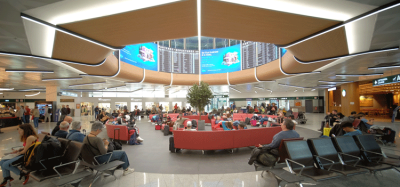Carsharing at Swedavia’s airports: Already transformative?
Posted: 6 May 2019 | Vita Andrews - Swedavia | No comments yet
As additional revenues become paramount to the success of airports, companies need to diversify to gain the highest income they can. At Swedavia, Head of Parking, Entry and Mobility, Vita Andrews, is faced with that very dilemma; how can the airports capitalise on the latest venture? Here, she reveals how carsharing could be the next big thing.


How has carsharing developed for us so far here at Swedavia AB? It has been around a long time as a service category and is hopefully now set to advance in a transformative way to enable rapid growth.
But before getting further into the topic of carsharing, I would like to give a brief overview of Swedavia AB. We are the state-owned actor responsible for the operating of all the larger airports in Sweden. Our biggest airport is Arlanda, which serves Stockholm and the surrounding region. Last year Arlanda served 27 million passengers. Stockholm is followed by Landvetter, which serves Gothenburg and its surrounding region, and welcomed seven million passengers in 2018. Overall, Swedavia served 42 million passengers during 2018.
Moving closer to the topic of carsharing, Swedavia has resources dedicated to managing and further developing what we call ‘Parking, Entry and Mobility’. Revenue-wise, parking is the biggest part of this. We manage just over 30,000 spaces designated for different uses. However, our mission is to facilitate the ways that passengers – as well as providers serving them and other aspects of our facilities – come into, dwell at and depart from our airports.
Join our free webinar: Revolutionising India’s travel experience through the Digi Yatra biometric programme.
Air travel is booming, and airports worldwide need to move passengers faster and more efficiently. Join the Digi Yatra Foundation and IDEMIA to discover how this groundbreaking initiative has already enabled over 60 million seamless domestic journeys using biometric identity management.
Date: 16 Dec | Time: 09:00 GMT
rEGISTER NOW TO SECURE YOUR SPOT
Can’t attend live? No worries – register to receive the recording post-event.
Most broadly, our goal at Swedavia is for parking, entry and mobility to serve its customers in the most environmentally-friendly, efficient and effective ways possible. Our goal is not to advance carsharing per-se, but to identify and embrace the best way for individual travellers and service providers to enter and depart the airport. From this perspective, we believe carsharing shows great potential.
Of course, carsharing is just one type of shared mobility. Looking more broadly, shared mobility is a way to share resource – something which has been embraced across society for a long time. Swedavia’s public airports and the air traffic control infrastructure which supports them are ubiquitous forms for resource sharing.
At Swedavia, we are still in the early stages of supporting strict carsharing. Our principal carsharing partner today is SunFleet, and our first arrangement to support them was introduced in 2014. We did have an additional arrangement with DriveNow, but the company decided to exit the Stockholm region in autumn 2018.
Today, we estimate that annual strict carsharing represents well under one per cent of all the means by which parties transport themselves to and from our airports. Our car rental partners, not surprisingly, view themselves as long-running actors in this market when a less limiting and likely more correct definition of it is applied. It is more useful to recognise that these services will continue to morph and evolve as new disruptive actors enter the market, too.
Our car rental partners are already working to transform how they facilitate arrangements whereby parties utilise their vehicles. Hertz and Avis, for example, have informed us they shall become fully-fledged carsharing actors; making it easier for their customers to contract for and access their vehicles whilst supporting shorter periods of use.
The carsharing market connected to Swedavia’s airports, however, still remains small. Our rental partners provide a highly-valued service that is expected by travellers. However, there is no fundamental barrier to seeing a larger number of travellers using these capabilities. How substantial can this become?
This brings us to a key point: the rate at which carsharing connected to our airports may accelerate will be determined by how people alter their attitudes and views to accommodate it. Successful resource sharing is closely connected to the concept of achieving network effects. Therefore, we need a situation where a critical mass of parties is using the same services.
Focus on sustainability
As a revenues exercise, carsharing is an important topic. But more than that, it is the sub-topic of one of the most crucial topics effecting the aviation industry: sustainability. As an industry we need to dramatically accelerate our efforts to introduce new ways of using resources with greater efficiency whilst achieving zero carbon results. Part of Swedavia’s mission is to lead in these efforts.
In Sweden, much change must still happen to support this. The government is already admirably progressive but needs to go further with revising laws and regulations. All manner of private enterprises must challenge themselves to embrace it more aggressively. Existing actors, along with entrepreneurial entrants, must move capital and other resources (such as creative, business and technical talent) towards this common goal.
Technological advances
While this article has so far discounted the role technological advances play in driving transformation, this is not to say they are not crucially important. Innovation in technology tends to happen on two levels: There are innovations that have pervasive common and therefore game-changing features – the emergence of the internet and introduction of mobile phone platforms are examples of this. Then, there are myriad other incremental innovations that get built on top of such game-changers.
In the case of carsharing, we already have all the core technological capabilities necessary to accelerate its advancement. The next game-changing platform will likely enable this further, but we cannot be certain when it shall come. So the current focus for actors in the market needs to be on introducing the useful incremental technology innovations that are already possible. This will be achieved through a combination of structured intentional forward thinking and pure trial and error. Both are needed, as they are complementary.
The common base that underlines these two features is talent. Highly-talented people who are incentivised with the right rewards are needed in this arena.
At Swedavia, we believe all these things are in motion. However, there is still work to be done. Most crucially, we need individuals to create greater demand by further embracing what carsharing already offers.
Biography
Vita Andrews has been with Swedavia AB for 10 years and took up her role as Head of Parking, Entry and Mobility in autumn 2018. She was previously Head of Retail, Food, Beverage and Advertising. Vita has spent much of her career in the air travel industry, previously working with Scandinavian Airlines. Prior to this, she did a PhD in economics at the Stockholm School of Economics, where she earlier completed her undergraduate studies.
The International Airport Summit is open for registration!
Date: 19 – 20 November 2025
Location: JW Marriott Hotel Berlin
At our flagship event of the year, we will dive into the future of airport operations, with expert-led sessions on passenger experience, innovative smart technologies, baggage handling, airside operations, data, security, and sustainability.
This is where global airport leaders come together to share insights, challenges, and real-world solutions.
Limited complimentary passes are available for eligible professionals – first come, first served!
Issue
Related topics
Aeronautical revenue, Passenger experience and seamless travel


















